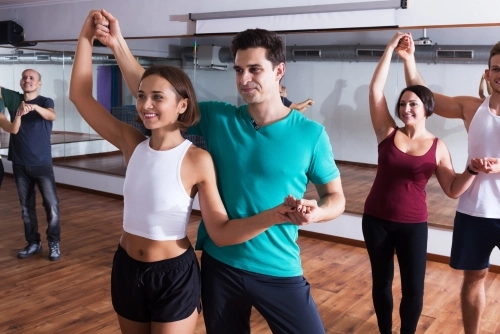The Ultimate Guide To Dance San Francisco
Wiki Article
The 10-Minute Rule for Dance San Francisco
Table of ContentsNot known Facts About Dance San FranciscoThe Of Dance San FranciscoThe Single Strategy To Use For Dance San FranciscoSome Ideas on Dance San Francisco You Need To Know
Dance kind Salsa training in Ecuador Salsa is a Latin dancing, connected with the songs style of the very same name, which was very first promoted in the United States in the 1960s in New York City City. Salsa is a combination of Cuban dancings, such as mambo, pachanga, and rumba, as well as American dances such as swing and tap. As American dancings such as swing and faucet.As salsa music spread to various other countries, different styles arised such as Cuban and Colombian salsa. Salsa stays preferred worldwide with enthnographic research into salsa having been done as for Benin, and Ghana. Salsa is a partnered dance where the lead takes the follower with a collection of rotates and turn patterns to music.
The basic Salsa dancing rhythm is composed of taking 3 steps for each four beats of music. Salsa professional dancers can likewise damage apart to dance solo, understood as "shines". The 2 major designs of salsa are linear and circular. In linear salsa, dancers stay in their "slot", changing locations from one side of the slot to the other, comparable to West Shore Swing New Yorkstyle salsa and LA-style salsa are both danced by doing this.
Here, professional dancers circle around each other, reminiscent of East Coast Swing. Integrating various other dancing designing strategies into salsa dancing has actually come to be really typical for both guys and females: foot work, arm job, body movement, rotates, body isolations, shoulder shimmies, rolls, also hand designing, balancings, and lifts.
Dance San Francisco Fundamentals Explained
Salsa dance is an international dancing that can be found in most city cities in the world. Celebrations are held each year, usually called a Salsa Congress, in various host cities intended to attract a selection of salsa professional dancers from other cities and countries. The events bring dancers with each other to share their interest for the dancing, develop community, and share relocations and tips.Video clip demonstrating salsa dancing principles Over the years, lots of various styles of salsa dancing have developed around the world. Incorporating other dance designing strategies right into salsa dance has actually also ended up being common, with dancers of one style incorporating designs and motions of others to create new fusions of dance designs.
It is a linear kind of salsa, where dancers dance in a port, comparable to LA design salsa - bay area salsa dancing. Unlike other styles of salsa, however, New York design is danced on the second beat of the music (" on 2"), and the follower, not the leader, actions ahead on the first action of the music
Among one of the most significant figures in New York design salsa is Eddie Torres. https://www.flickr.com/people/199658312@N04/ (referred to as "the Mambo King"), that is credited with aiding to define the on 2 salsa timing (based upon mambo) and helping to popularize it by teaching it in dancing workshops in New york city and through early educational tapes
Some Of Dance San Francisco
LA style salsa is danced in a line or "port" with professional dancers exchanging placements throughout the dance, unlike Cuban salsa which is danced in a more circular fashion.In this pattern, the leader actions onward on 1, steps to the precisely 2-3 while transforming 90 degrees counter-clockwise (facing to the left), leaving the port open. The fan after that tips straight ahead on 5-6 and activates 78, while the leader makes an additional 90 levels counter-clockwise and slightly onward, returning right into the slot.
The "Vazquez Brothers" (Luis Vazquez, Francisco Vazquez, and Johnny Vazquez) are credited for the early advancement and growth of LA Design. Luiz Vazquez was the co-founder of Los Angeles's very first salsa dance group, Salsa Brava.

Dance San Francisco Can Be Fun For Anyone
The name Gambling enterprise is obtained from the Spanish term for the dance halls, "Gambling establishments Deportivos" where much social dance was done among the better-off, white Cubans throughout the mid-20th century and onward (bay area salsa dancing). Historically, Casino site traces its beginning as a companion dancing from Cuban Child, Cha Cha Cha, Danzn and Guaracha
Report this wiki page